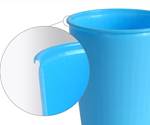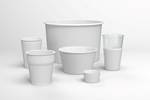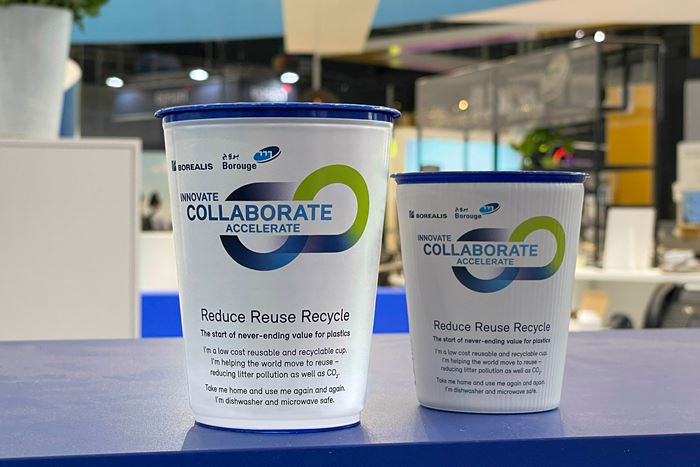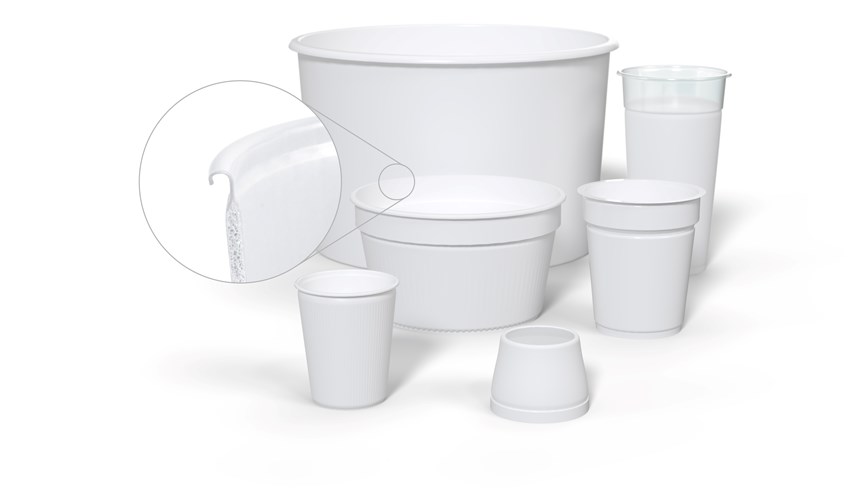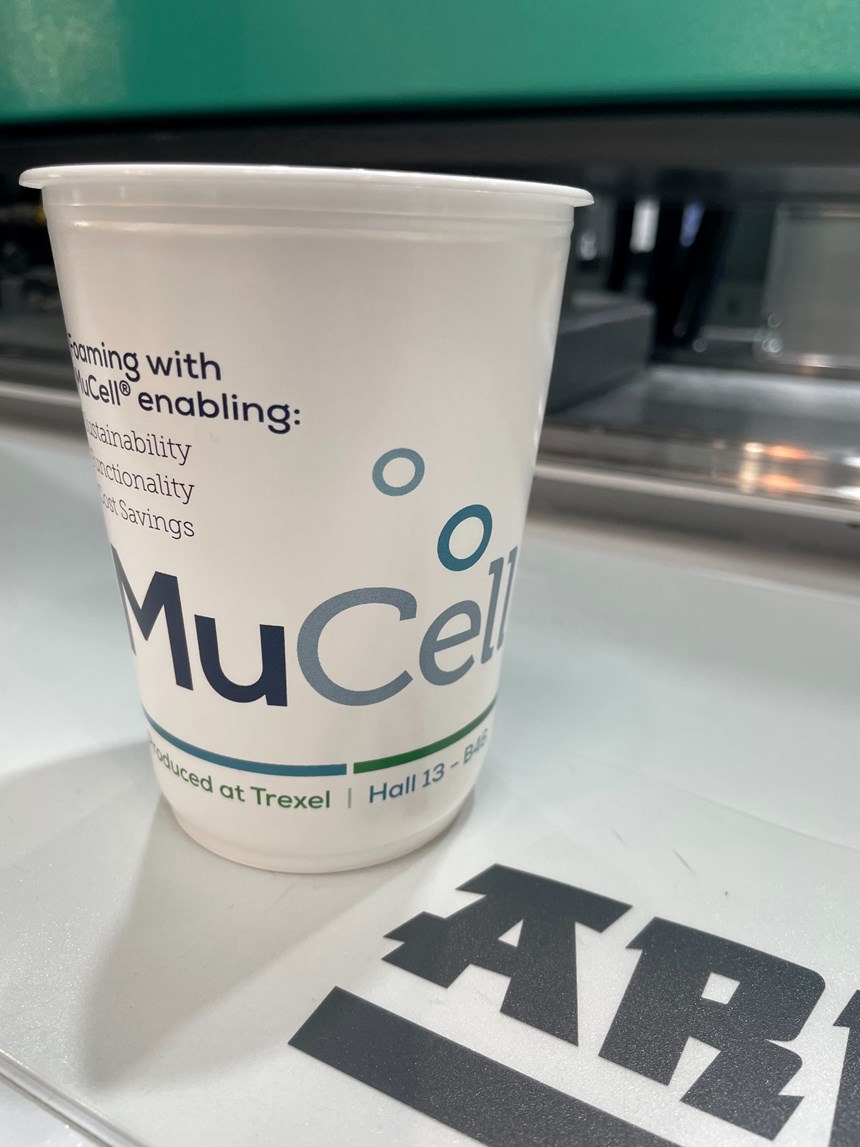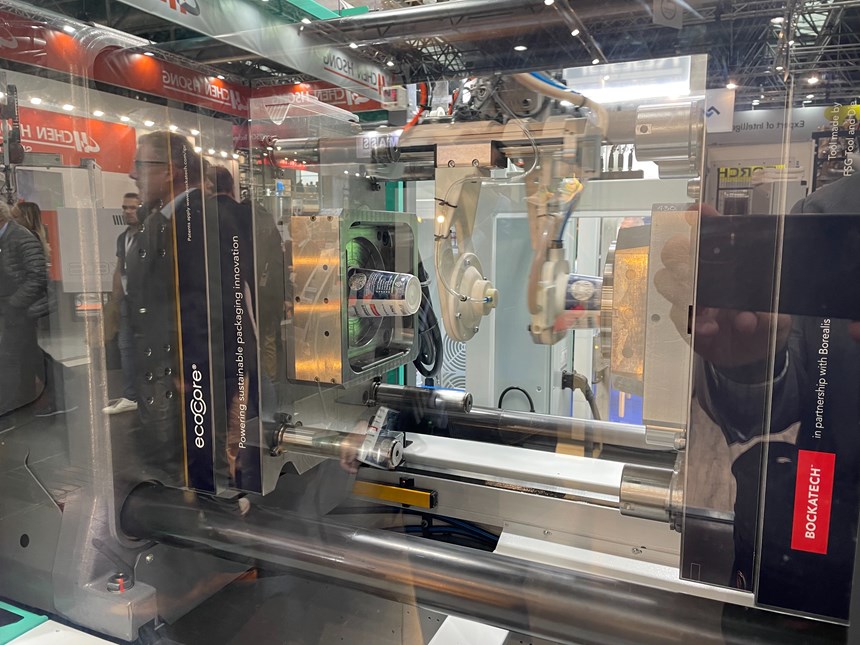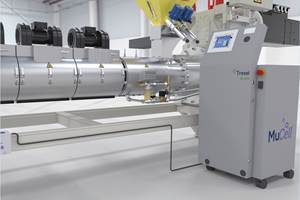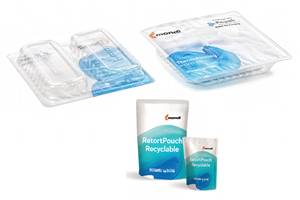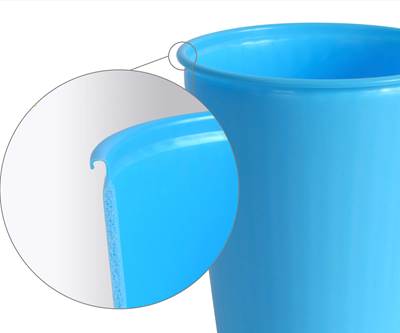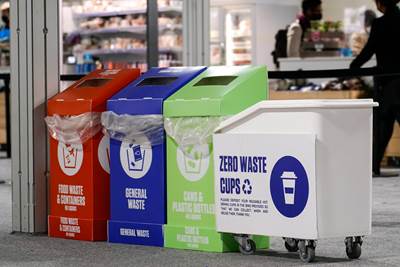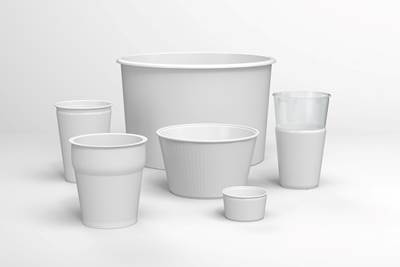When Bockatech’s EcoCore foam technology made its global splash at K three years ago, the 430-ml cup the company molded weighed in at 20g with a 10-sec cycle time and a 2-mm insulated skin-foam-skin wall. Ahead of K 2022 at Arburg’s Technology Days event in June, the company molded a 14g 430-ml cup in a 6-sec cycle with a 2-mm foamed wall on an All Rounder 470 S from Borealis-supplied polypropylene (PP). Bockatech’s technology works by taking a foam-laden melt—originally powder or liquid chemical foaming agents (CFAs) were added to pellets prior to molding, now Trexel’s MuCell process can be applied to introduce nitrogen to the melt in the barrel—injecting that material rapidly to allow a skin to form, and then just as rapidly opening the mold, which completes the foaming process outside the press. This can take a typical foam injection molding process from a 60-sec cycle time down to 6 seconds, according to Bockatech.
Bockatech EcoCore Products
This K, the company will display products made with the technology at the booth of Borealis, which it partners with as a material supplier for the process, and also at Trexel’s stand, with a mold running Bockatech-foamed parts. There the company will once again mold EcoCore cups using an Arburg 520 A All Rounder injection molding machine applying Trexel’s MuCell microcellular foaming.
Bockatech notes that processors could still use CFAs to achieve the foaming, but explains that EcoCore moldings made with MuCell feature different cell structures to those made with the agents, resulting in containers that take advantage of greater expansion and density reductions up to 70%. The technology works on any existing “packaging spec” machine, Bockatech says, but shifting to MuCell would mean converting the press’s barrel to support that technology and adding Trexel’s SCF (super critical fluid) delivery system.
Bockatech’s EcoCore innovation covers three main areas: the design of molds; plasticizing as well as processing parameters; and the use of a customized polypropylene blend including foaming agents. EcoCore is extensively patented and Bockatech’s current business model is to license it to manufacturers and brands and supply technical knowhow in addition to helping licensees design and build tools.
The company says that compared to a core-back foaming process, where the mold is opened slightly after injection, allowing the foam to expand, or processes where foam is injected into the tool from the barrel, EcoCore involves injecting plastic with gas in it extremely quickly; creating a skin layer on the core and cavity; and then opening the mold completely for a controlled foaming process outside of the tool. Bockatech calls this ROME (rapid open mold expansion), with the result being 5-7 sec cycle times and 50% weight savings.
The company says resulting containers are roughly 5 times stiffer than standard packaging of same material and weight, with double the insulative properties. The containers can be decorated via IML, offset printing, screen printing and more. “Anything you can do to a polyolefin container, you can do to EcoCore,” Bocking says. At Technology Days, Bockatech CEO Henri Gaskjenn took a newly molded cup and placed it open side down on the ground and stood on top of it with all his body weight having no effect on the container.
Low-Hanging Fruit
Initially the technology was developed targeting reusable coffee cups, so-called “low hanging fruit,” according to Martin Blacher, director Bockatech; and Chris Bocking, company founder. In addition to reusability, the company sought a mono-material recyclable cup with reduced density and insulative properties. Over the last three years, Blacher and Bocking say the company has targeted additional verticals in packaging and elsewhere. In addition to insulative properties for hot drinks, the foam core also prevents condensation buildup for cold drinks in humid environments.
“The segment we’re going after is more sustainable packaging solutions,” Blacher says. “Where a lot of sustainable packaging solutions fall down today is that they’re not cost competitive. We want to bring to market cost-competitive sustainable packaging.” For instance, Blacher and Bocking note that moving away from single-use packaging, particularly if it doesn’t have a ready and robust recycling stream, can boost sustainability, but that a lot of reusable packaging today is quite heavy, making the number of times the package would have to be reused to achieve economic and carbon “break even”, very high.
Part of Bockatech’s to-market strategy is to lock in a global brand and show that its technology is feasible on a mass production scale. The company believes that if big brand owners were to partner with converters on commercialization, it could speed adoption.
“Converters have capex tied into existing molds,” Bocking says. “It would be hard for them to pre-invest before a brand is on board.”
Beyond the reusable cup, Bockatech says it has seen significant weight savings in caps and closures, using its technology to cut weight while increasing top loads. Other potential applications would be just-add-hot-water food pots, reusable bowls as well as clam shells for food service and pails. The company is working primarily in cylindrical forms at this time, but Blacher says as the platform progresses, it will get into other shapes over next few years.
In addition to the foamed core, parts can be designed that combine opaque foamed as well as clear sections. By controlling where foaming occurs, Bockatech says it can design in areas where two skins are touching in the mold. These then solidify and result in transparent sections around foamed areas for a distinct contrast.
Bockatech says that the mold design and manufacture for EcoCore are important, particularly when it comes to getting a consistent wall thickness and temperature profile across the surface. “We’re more fussy,” Bocking says. “If you had a thicker hot spot on the tool surface, you’ll get different expansion sizes.” In terms of cavitation, the company is looking at more cavities for smaller parts, possibly 24 or 32, and for larger parts, like cups, 4 or 8 cavities, although Bockatech explains that faster cycles can also mean greater production from a lower cavitation tool.
Related Content
Foam-Core Multilayer Blow Molding: How It’s Done
Learn here how to take advantage of new lightweighting and recycle utilization opportunities in consumer packaging, thanks to a collaboration of leaders in microcellular foaming and multilayer head design.
Read MoreIn Sustainable Packaging, the Word is ‘Monomaterial’
In both flexible and rigid packaging, the trend is to replace multimaterial laminates, coextrusions and “composites” with single-material structures, usually based on PE or PP. Nonpackaging applications are following suit.
Read MoreImpacts of Auto’s Switch to Sustainability
Of all the trends you can see at NPE2024, this one is BIG. Not only is the auto industry transitioning to electrification but there are concerted efforts to modify the materials used, especially polymers, for interior applications.
Read MoreMultilayer Solutions to Challenges in Blow Molding with PCR
For extrusion blow molders, challenges of price and availability of postconsumer recycled resins can be addressed with a variety of multilayer technologies, which also offer solutions to issues with color, processability, mechanical properties and chemical migration in PCR materials.
Read MoreRead Next
Bockatech and Westfall Technik Solidify EcoCore Foam Core Technology License Deal
Westfall Technik to promote use of EcoCore PP foam core technology in the U.S. to create new opportunities for more sustainable lightweight single-use and reusable packaging.
Read MoreEcoCore PP-Based Recyclable and Reusable ‘Zero-Waste’ Cups Used At COP26
Bockatech’s EcoCor foam core technology for lightweight and reusable packaging ‘starred’ at this year’s conference.
Read MoreBorealis Acquires Minority Stake in Sustainable Packaging Innovator Bockatech
New move bolsters the two companies’ existing partnership and underscores Borealis’ commitment to plastics circularity.
Read More


